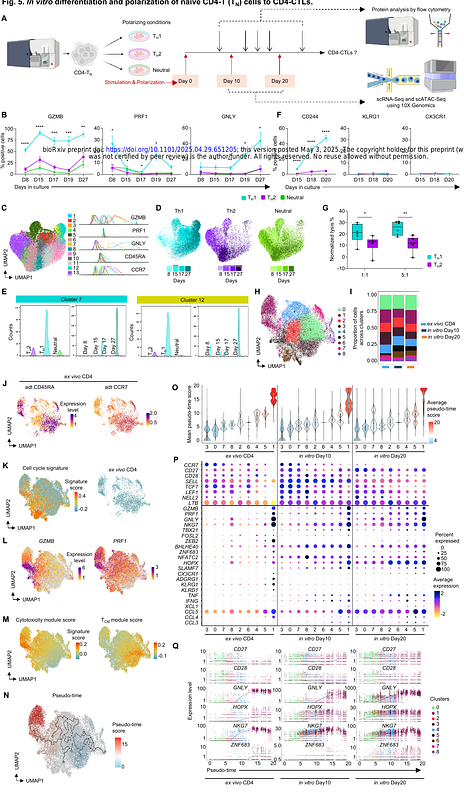A distinct subset of stem-cell memory is poised for the cytotoxicity program in CD4+ T cells in humans.

A distinct subset of stem-cell memory is poised for the cytotoxicity program in CD4+ T cells in humans.
Kar, R.; Sinha, S.; Khatun, Z.; Sharma, A.; Patil, V. S.
AbstractThe peripheral CD4+ T-cells with cytolytic potential (CD4-CTLs) have been detected in several diseases, including infectious diseases and various cancers. They form the component of protective immune response and are shown to be enriched in the effector memory expressing CD45RA (TEMRA) in humans. However, the lack of understanding about their lineage, molecular characters, and cytolytic potential in comparison to CD8-CTLs has restricted their utility. Thus, in this study, by parallelly analysing the CD4-CTLs and CD8-CTLs, we demonstrate that they are indistinguishable for the cytolytic program, with both showing similar gene expression profile and T cell antigen-receptor (TCR) clonal expansion in humans. Further, using an integrative multi-omics analysis combining the transcriptome, TCR repertoire, and open chromatin profile of CD4+ naive (CD4-TN) and memory T-cell subsets, we discovered a distinct stem-cell memory subset (TSCM-CTL) that is pre-committed to the cytolytic program that shared significant TCR clonotypes with expanded CD4-CTL-effectors. Further, through an in vitro differentiation model, we developed CD4+ T-cells with cytolytic potential (iCD4-CTLs) from CD4-TN cells that showed gradual and progressive acquisition of cytolytic program, exhibiting progressive chromatin accessibility at cytotoxicity-associated genes. Of particular interest was the property of iCD4-CTLs that co-expressed longevity-associated genes along with cytotoxicity-associated genes, hence generating long-lived CD4-CTL-effectors. Overall, the process of generation of iCD4-CTLs from CD4-TN, deciphered the molecular signatures of early commitment to the cytotoxicity program. Together, our study advocates for exploring both CD4-CTLs and CD8-CTLs for vaccine development, vaccine efficacy testing, as well as immunotherapies and cell-based therapies for precision medicine.